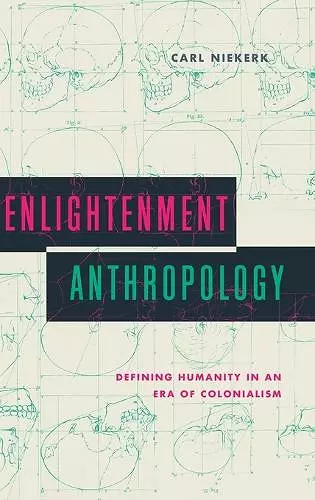Enlightenment Anthropology
Defining Humanity in an Era of Colonialism
Format:Hardback
Publisher:Pennsylvania State University Press
Published:16th Apr '24
Should be back in stock very soon
This hardback is available in another edition too:
- Paperback£30.99(9780271096872)

An erudite examination of the origins of modern anthropology in the European Enlightenment in Germany.
In this book, Carl Niekerk probes the origins of modern anthropology in the European Enlightenment, foregrounding how the knowledge transfer between an international array of natural historians and public intellectuals—including Georges-Louis Leclerc, Comte de Buffon; Voltaire; Denis Diderot; Johann Friedrich Blumenbach; Immanuel Kant; and Johann Gottfried Herder—shaped the emerging discipline and its central debates. Reexamining how these many voices crossed paths and diverged, Niekerk sharpens our understanding of how anthropology, as we know it today, came to be.
As a “natural history of man,” anthropology during the Enlightenment argued that humans across the globe belonged to a single species and that human diversity could be explained as the product of time and space, climate and geography. While this knowledge could be emancipatory—fostering curiosity rather than superiority around questions of difference among some thinkers—it also contributed to the emergence of new notions, especially “race” and “culture,” that were used by many to justify slavery and the colonial project.
With an emphasis on how we can use the ambiguities and deficiencies of the past to help guide our thinking and actions today, this book will appeal to a widely interdisciplinary audience, including anthropologists, historians and philosophers of science, intellectual historians, Germanists, and scholars of the European Enlightenment.
“Niekerk’s intellectual history is powerful in the simplicity of its thesis: that in its development out of natural history, the discipline we know as anthropology converged on important conclusions about the unity and diversity of the human species in its interaction with the natural environment. . . . [It] admirably brings into focus those who made significant early advances in physical and cultural anthropology.”
—Evan F. Kuehn The European Legacy
“Niekerk reconstructs the emergent discipline of anthropology as a major feature of the European Enlightenment, emphasizing not only its scientific ambitions but also its political inspiration and intention: a ‘radical’ opposition to the enslavement of non-European populations and to the excesses of colonialism. He sketches a line from Buffon to Camper, Blumenbach, and Herder, adding original characterizations of the contributions of Raynal and de Pauw. This is a rich and rewarding study.”
—John Zammito, author of The Gestation of German Biology: Philosophy and Physiology from Stahl to Schelling
“In lucid and accessible prose, Niekerk situates Enlightenment anthropology at the nexus of an international debate about the definition of the human and the universal, alongside scientific discourses that rely on concepts of race and culture to limit that humanity. Persuasive and innovative, Niekerk’s book about the emerging field of anthropology and its antecedents makes a significant and original contribution to the fields of philosophy, literary and cultural studies, and history.”
—Patricia Anne Simpson, author of The Play World: Toys, Texts, and the Transatlantic German Childhood
“The reconstruction of the shift from climate theory to the notion of culture provides a valuable and timely contribution to an ongoing debate about race, colonialism, and the emerging science of anthropology that bridges multiple disciplines.”
—Ansgar Lyssy History of European Ideas
ISBN: 9780271096865
Dimensions: 229mm x 152mm x 25mm
Weight: 513g
270 pages